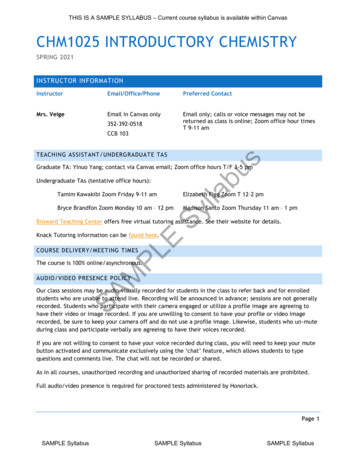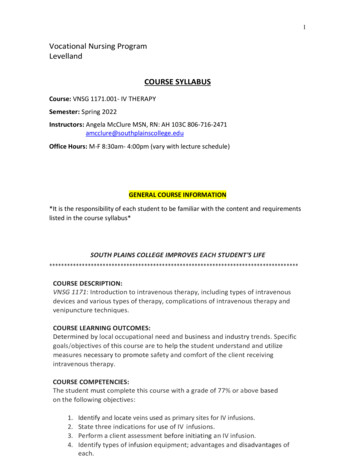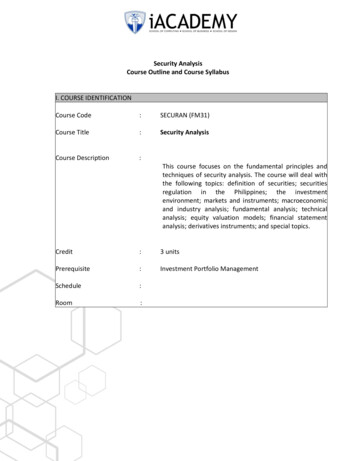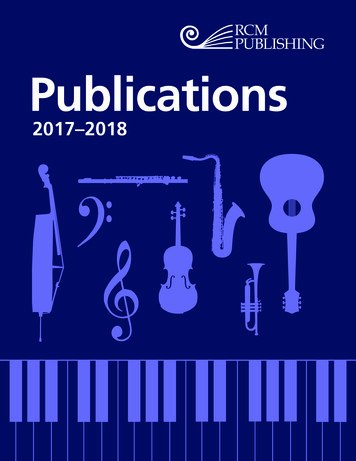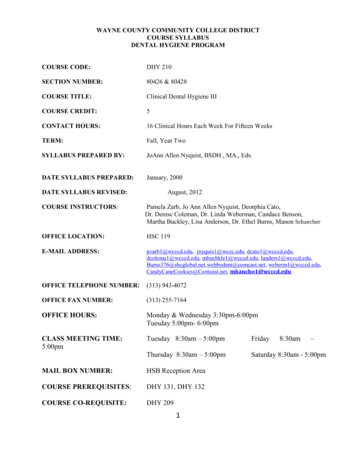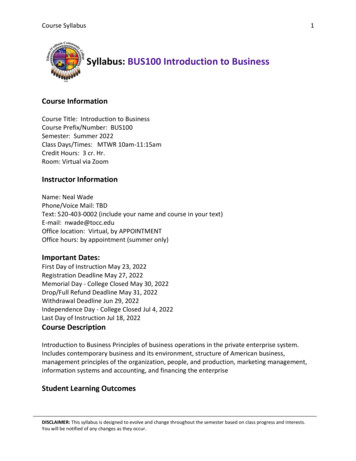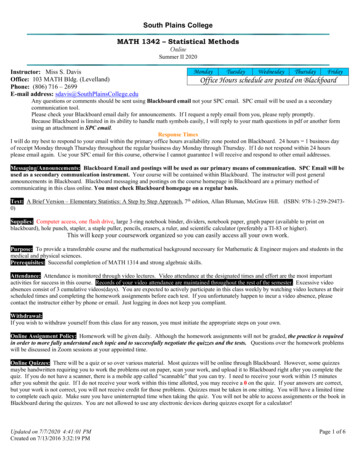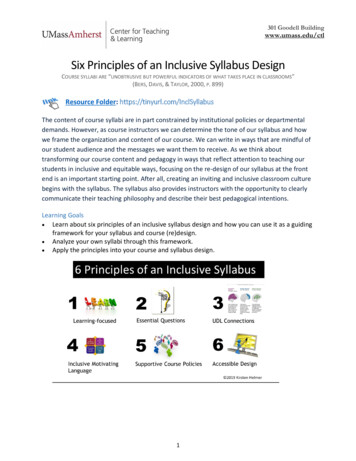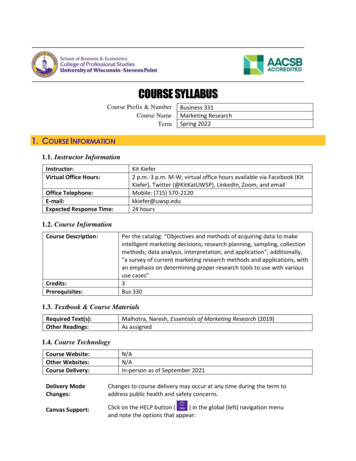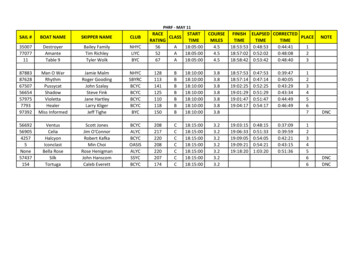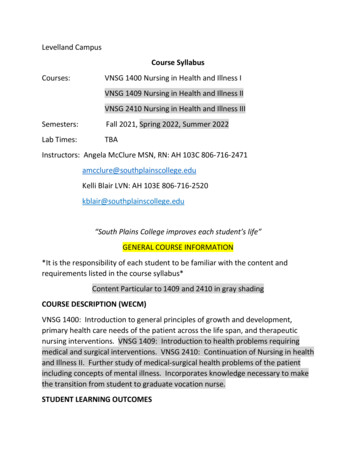
Transcription
Levelland CampusCourse SyllabusCourses:VNSG 1400 Nursing in Health and Illness IVNSG 1409 Nursing in Health and Illness IIVNSG 2410 Nursing in Health and Illness IIISemesters:Fall 2021, Spring 2022, Summer 2022Lab Times:TBAInstructors: Angela McClure MSN, RN: AH 103C 806-716-2471amcclure@southplainscollege.eduKelli Blair LVN: AH 103E 806-716-2520kblair@southplainscollege.edu“South Plains College improves each student’s life”GENERAL COURSE INFORMATION*It is the responsibility of each student to be familiar with the content andrequirements listed in the course syllabus*Content Particular to 1409 and 2410 in gray shadingCOURSE DESCRIPTION (WECM)VNSG 1400: Introduction to general principles of growth and development,primary health care needs of the patient across the life span, and therapeuticnursing interventions. VNSG 1409: Introduction to health problems requiringmedical and surgical interventions. VNSG 2410: Continuation of Nursing in healthand Illness II. Further study of medical-surgical health problems of the patientincluding concepts of mental illness. Incorporates knowledge necessary to makethe transition from student to graduate vocation nurse.STUDENT LEARNING OUTCOMES
(DECS Differentiated Essential Competency Skills Vocational Nursing) TexasBoard of NursingAt the completion of the course, students will:1. Compare and contrast normal body functions with that of pathologicalvariations.2. Identify disease process by definition, assessment and diagnostics.3. Assist in formulation of a plan of care utilizing the nursing process formedical-surgical conditions.4. Provide patient/family education.5. Demonstrate use of nursing process in regard to drug therapy.6. Discuss normal aging, system changes, common disease processes, lifestylechanges, common issues and needs during the aging process.7. Discuss the principles of nutrition, the digestive process, food nutrients,diet therapy and diet modifications.COURSE OBJECTIVES (C1, C5, C6, C7, C8, C9, C12, C14, C18, C20; F1, F2, F5, F7, F8,F9, F11, F12, F13, F16, F17EVALUATION METHODSUnit exams, written assignments, final examination, quizzes and other projects asassigned.ACADEMIC INTEGRITYIt is the aim of the faculty of South Plains College to foster a spirit of completehonesty and a high standard of integrity. The attempt of any student to presentas his or her own work which he or she has not honestly performed is regarded bythe faculty and administration as a most serious offense and renders the offenderliable to serious consequences, possibly suspension.Cheating: Dishonesty of any kind on examinations or on written assignmentsillegal possession of examinations, the use of unauthorized notes during anexamination, obtaining information during an examination from the textbook orfrom the examination paper of another student, assisting others to cheat,alteration of grade records, illegal entry or unauthorized presence in the faculty
offices are examples of cheating. Complete honesty is required of the student inthe presentation of any and all phases of coursework. This applies to quizzes ofwhatever length, as well as final examinations, to daily reports and to termpapers.Plagiarism: Offering the work of another as one’s own, without properacknowledgment, is plagiarism; therefore, any student who fails to give credit forquotations or essentially identical expression of material taken from books,encyclopedias, magazines and other reference works, or from themes, reports orother writings of a fellow student, is guilty of plagiarism.VERIFICATION OF WORKPLACE COMPETENCIESNo external learning experiences provided. Successful completion of the DECScompetency statements at the level specified by the course (Level Objectives) willallow the student to continue to advance within the program. Upon successfulcompletion of the program, students will be eligible to take the state board exam(NCLEX PN) for vocational nurse licensure.BLACKBOARDBlackboard is an e-Education platform designed to enable educational innovationseverywhere by connecting people and technology. This educational tool will beused in this course throughout the program.FACEBOOKPlease see the Facebook page for the nursing program for general information.SCANS AND FOUNDATION SKILLSRefer also to Course Objectives. Scans and Foundation Skills attached.ADDITIONAL CLASSROOM ITEMSStudents should come to class prepared with pens, pencils, and writing materialfor taking notes, quizzes, or assignments in class. Students should be prepared totake notes over lecture material if they choose. You will also be required to
purchase and use pre-printed medication cards. Any other format will not beaccepted. Black or blue ink pens must be used for assignments and medicationcards. Purple ink pens should be used for correction as requested by theinstructor. You must have computer, internet and printer. See VocationalNursing Handbook for dress code for the classroom and skills lab.The student MUST have the most recent edition of the required textbooks andworkbooks. Students will NOT be allowed to attend unless the newest edition isbrought to class. See student handbook for requirements for bringing textbooksto class.Students will not be allowed to use programmable calculator or phone calculatorsduring testing. Student seating and placement will be at the discretion of theinstructor during lecture and testing. Students may not have cell phones, or“smart watches”, or any other electronic device on their person or on the deskduring testing.ATTENDANCE POLICYClass AttendanceStudents are expected to attend all classes in order to be successful in a course.The student may be administratively withdrawn from the course when absencesbecome excessive as defined in the course syllabus.When an unavoidable reason for class absence arises, such as illness, an officialtrip authorized by the college or an official activity, the instructor may permit thestudent to make up work missed. It is the student’s responsibility to completework missed within a reasonable period of time as determined by the instructor.Students are officially enrolled in all courses for which they pay tuition and fees atthe time of registration. Should a student, for any reason, delay in reporting to aclass after official enrollment, absences will be attributed to the student from thefirst-class meeting.Students who enroll in a course but have “Never Attended” by the official censusdate, as reported by the faculty member, will not be administratively dropped bythe Office of Admissions and Records. A student who does not meet theattendance requirements of a class as stated in the course syllabus and does not
officially withdraw from that course by the official census date of the semester,may be administratively withdrawn from that course and receive a grade of “X” or“F” as determined by the instructor. Instructors are responsible for clearly statingtheir administrative drop policy in the course syllabus, and it is the student’sresponsibility to be aware of that policy.It is the student’s responsibility to verify administrative drops for excessiveabsences through MySPC using his or her student online account. If it isdetermined that a student is awarded financial aid for a class or classes in whichthe student never attended or participated, the financial aid award will beadjusted in accordance with the class in which the student did attend/participateand the student will owe any balance resulting from the adjustment.Contact hours: 96. See SPC catalogue or Vocational Nursing Student Handbook.Students are expected to attend all classes, arrive on time, and to remain for theentire class period. Attendance will be taken at the beginning of class: a studentnot present will be marked absent in the attendance record. Students absentmore than 12 hours will be removed from the course. Three (3) tardies count asone (1) hours’ absence. There are no excused absences.ASSIGNMENT POLICYAll class assignments are to be turned in by 0800 on the due date announced orthe assignment will be considered late. Ten (10) points will be deducted from thepaper for each day turned in late. Failure to complete assignments will result in agrade of INCOMPLETE. Please refer to the Student Handbook for VocationalNursing.COMPUTER USAGEAs computer technology in the field of health occupations continues to becomemore popular, computers will be used in this course for several assignments. Allstudents have access to computers and printers on the South Plains Collegecampus. Students will be expected to utilize computers to access assignmentsand classroom resources. All registered students are supplied with a workingemail account from South Plains College. In order to take exams, students musthave their user name and password.
ALL STUDENTS ARE EXPECTED TO KNOW THEIR SPC STUDENT USER NAME ANDPASSWORDCOMPUTER LAB USAGEThe computer lab(s) will only be available to students who are testing.EXAMSThere will be an exam after the completion of each assigned unit, and acomprehensive final examination at the end of the course. Unit exams will not bemade up. A grade of 0 (zero) will be given. The lowest test grade will be dropped.Always be prepared for an unannounced pop quiz. Quizzes are not eligible formake-up and a grade of 0 (zero) will be automatically given.GRADING POLICYA grade of 77% is required to pass this course.VNSG 1400Unit/pharm. exams60%Assignments20%Final Examination20%VNSG 1409Unit Exams60%Assignments20%Final Examination20%VNSG 2410Unit Exams60%Assignments20%
Final Examination20%Grading Scale:A100-90B89-80C79-77D70-76F69 and belowGrades are not rounded: 76.9 is a DThe student must receive a minimum of 77% in each course, and meet thespecified clinical criteria within a semester in order to qualify for progression tothe next semester.COMMUNICATION POLICYElectronic communication between instructor and students in this course willutilize the South Plains College “MySPC” and email systems. The REMIND systemwill also be used. Do NOT use electronic media, email or texting to communicateANY patient information. The instructor will not initiate communicate usingprivate email accounts.CAMPUS CARRYCampus Concealed Carry - Texas Senate Bill - 11 (Government Code 411.2031, etal.) authorizes the carrying of a concealed handgun in South Plains Collegebuildings only by persons who have been issued and are in possession of a TexasLicense to Carry a Handgun. Qualified law enforcement officers or those who areotherwise authorized to carry a concealed handgun in the State of Texas are alsopermitted to do so. Pursuant to Penal Code (PC) 46.035 and South Plains Collegepolicy, license holders may not carry a concealed handgun in restricted locations.For a list of locations, please refer to the SPC policy at:
(http://www.southplainscollege.edu/human resources/policy procedure/hhc.php)Pursuant to PC 46.035, the open carrying of handguns is prohibited on all SouthPlains College campuses. Report violations to the College Police Department at806-716-2396 or 9-1-1.ACCOMMODATIONS4.1.1.1. Diversity StatementIn this class, the teacher will establish and support an environment that valuesand nurtures individual and group differences and encourages engagement andinteraction. Understanding and respecting multiple experiences andperspectives will serve to challenge and stimulate all of us to learn about others,about the larger world and about ourselves. By promoting diversity andintellectual exchange, we will not only mirror society as it is, but also modelsociety as it should and can be.4.1.1.2. Disabilities StatementStudents with disabilities, including but not limited to physical, psychiatric, orlearning disabilities, who wish to request accommodations in this class shouldnotify the Disability Services Office early in the semester so that the appropriatearrangements may be made. In accordance with federal law, a studentrequesting accommodations must provide acceptable documentation of his/herdisability to the Disability Services Office. For more information, call or visit theDisability Services Office at Levelland (Student Health & Wellness Office) 806716-2577, Reese Center (Building 8) 806-716-4675, or Plainview Center (MainOffice) 806-716-4302 or 806-296-9611.4.1.1.3 Non-Discrimination StatementSouth Plains College does not discriminate based on race, color, national origin,sex, disability or age in its programs and activities. The following person has
been designated to handle inquiries regarding the non-discrimination policies:Vice President for Student Affairs, South Plains College, 1401 College Avenue,Box 5, Levelland, TX 79336. Phone number 806-716-2360.4.1.1.4 Title IX Pregnancy Accommodations StatementIf you are pregnant, or have given birth within six months, Under Title IX youhave a right to reasonable accommodations to help continue your education. Toactivate accommodations, you must submit a Title IX pregnancyaccommodations request, along with specific medical documentation, to theDirector of Health and Wellness. Once approved, notification will be sent to thestudent and instructors. It is the student’s responsibility to work with theinstructor to arrange accommodations. Contact the Director of Health andWellness at 806-716-2362 or email cgilster@southplainscollege.edu forassistance.4.1.1.5 Campus Concealed Carry StatementTexas Government Code 411.2031 et al. authorizes the carrying of a concealedhandgun in South Plains College buildings by individuals and in accordance withTexas Government Code 411.209 (a). All holders of a valid Texas License to Carrymay carry on their person a handgun that is concealed in accordance with TexasPenal Code 46.03 (a-2). Qualified law enforcement officers or those who areotherwise authorized to carry a concealed handgun in the State of Texas arealso permitted to do so. Pursuant to Penal Code (PC) 46.035 and South PlainsCollege policy. Individuals may not carry a concealed handgun in restrictedlocations. For a list of locations and Frequently Asked Questions, please refer tothe Campus Carry page php. Concealed Carry (AlsoKnown as Campus Carry) FAQs. What is Senate Bill 11, sometimes known asCampus Carry? Texas Senate Bill 11 allows for the carrying of concealedhandguns on Texas public institution campuses by individuals holding a validTexas License to Carry (LTC) or Concealed Handgun License (CHL). Reportviolations to the College Police Department at 806-716-2396 or 9-1-1.STUDENT CONDUCT
Rules and regulations relating to the students at South Plains College are madewith the view of protecting the best interests of the individual, the generalwelfare of the entire student body and the educational objectives of the college.As in any segment of society, a college community must be guided by standardsthat are stringent enough to prevent disorder, yet moderate enough to providean atmosphere conducive to intellectual and personal development.A high standard of conduct is expected of all students. When a student enrolls atSouth Plains College, it is assumed that the student accepts the obligations ofperformance and behavior imposed by the college relevant to its lawful missions,processes and functions. Obedience to the law, respect for properly constitutedauthority, personal honor, integrity and common sense guide the actions of eachmember of the college community both in and out of the classroom.Students are subject to federal, state and local laws, as well as South PlainsCollege rules and regulations. A student is not entitled to greater immunities orprivileges before the law than those enjoyed by other citizens. Students aresubject to such reasonable disciplinary action as the administration of the collegemay consider appropriate, including suspension and expulsion in appropriatecases for breach of federal, state or local laws, or college rules and regulations.This principle extends to conduct off-campus which is likely to have adverseeffects on the college or on the educational process which identifies the offenderas an unfit associate for fellow students.Any student who fails to perform according to expected standards may be askedto withdraw.Rules and regulations regarding student conduct appear in the current StudentGuide.SPECIAL REQUIREMENTS (*Read Carefully) Recording of lectures, presentation and discussions is not permitted Required readings: See text and materials list. It is required that eachchapter be read prior to the first lecture hour for the chapter. The studentis responsible for completing the learning objectives and learning the keyterms at the beginning of the chapter.
The assigned medical terminology chapter(s) will be due at 0800 on themorning lecture will begin for that subject. See weekly schedule handout.The workbook must be not written in. The assignment will be graded oncompleteness and accuracy. Chapters for each unit will be graded, thenaveraged together for one grade per unit. Please see information regarding drug cards. Ethical Decision-Making Activity: The student will select a case study fromthe syllabus and complete the ethical decision-making activity. Select adifferent case study each semester. The due date for VNSG 1400 is 0800 onSeptember 27, 2021. The due date for VNSG 1409 is 0800 on February 28,2022. See grading criteria. Late papers will have 10 points deducted foreach class day late. ATI testing policyo Students will be required to participate in ATI testing. In 1409, thestudent will take the Fundamentals test, during mid-semester. In2410, the student will be required to take the Med/Surg, thePharmacology portion, and the ATI Comprehensive/Predictor.Students will purchase and receive books at the beginning of theyear/semestero Each ATI test result, with the exception of theComprehensive/Predictor, will be recorded to be averaged in withthe other test grade as follows: Score: Level 3100% Level 293% Level 177% Below level 170% The ATI test results will NOT be eligible to be the lowest grade removed inthe course ATI testing results will affect overall test average! Practice tests: Printed results of practice tests must be submitted on thedate required. A passing score is required on submitted practice tests.Students are urged to fully utilize provided texts, planning, timemanagement techniques, and practice testing opportunities.
To fulfill the graduation requirement:The NCLEX PN comprehensive/predictor exam will be taken in the third semester. The student must complete 2 practice tests on the NCLEX PNcomprehensive/predictor. For one of the practice tests, the student mustuse the practice mode that allows review after each question. It is verylikely the student will need to devote a great deal of time on this process.REMINDER: THE STUDENT MUST HAVE ACCESS TO A COMPUTER WITHINTERNET ACCESS, AND A PRINTER FOR THESE TESTS.BASIC SKILLS–Reads, Writes, Performs Arithmetic and Mathematical Operations, Listens andSpeaksF-1 Reading–locates, understands, and interprets written information in prose and indocuments such as manuals, graphs, and schedules.F-2 Writing–communicates thoughts, ideas, information and messages in writing and createsdocuments such as letters, directions, manuals, reports, graphs, and flow charts.F-3 Arithmetic–performs basic computations; uses basic numerical concepts such as wholenumbers, etc.F-4 Mathematics–approaches practical problems by choosing appropriately from a variety ofmathematical techniques.F-5 Listening–receives, attends to, interprets, and responds to verbal messages and other cues.F-6 Speaking–organizes ideas and communicates orally.THINKING SKILLS–Thinks Creatively, Makes Decisions, Solves Problems, Visualizes and KnowsHow to Learn and ReasonF-7 Creative Thinking–generates new ideas.F-8 Decision-Making–specifies goals and constraints, generates alternatives, considers risks,evaluates and chooses best alternative.F-9 Problem Solving–recognizes problems, devises and implements plan of action.F-10 Seeing Things in the Mind’s Eye–organizes and processes symbols, pictures, graphs,objects, and other information.
F-11 Knowing How to Learn–uses efficient learning techniques to acquire and apply newknowledge and skills.F-12 Reasoning–discovers a rule or principle underlying the relationship between two or moreobjects and applies it when solving a problem.PERSONAL QUALITIES–Displays Responsibility, Self-Esteem, Sociability, Self-Management,Integrity and HonestyF-13 Responsibility–exerts a high level of effort and perseveres towards goal attainment.F-14 Self-Esteem–believes in own self-worth and maintains a positive view of self.F-15 Sociability–demonstrates understanding, friendliness, adaptability, empathy andpoliteness in group settings.F-16 Self-Management–assesses self accurately, sets personal goals, monitors progress andexhibits self-control.F-17 Integrity/Honesty–chooses ethical courses of action.SCANS COMPETENCIESC-1 TIME - Selects goal - relevant activities, ranks them, allocates time, prepares and followsschedules.C-2 MONEY - Uses or prepares budgets, makes forecasts, keeps records, and makesadjustments to meet objectives.C-3 MATERIALS AND FACILITIES - Acquires, stores, allocates, and uses materials or spaceefficiently.C-4 HUMAN RESOURCES - Assesses skills and distributes work accordingly, evaluatesperformances and provides feedback.INFORMATION - Acquires and Uses InformationC-5 Acquires and evaluates information.C-6 Organizes and maintains information.C-7 Interprets and communicates information.C-8 Uses computers to process information.
INTERPERSONAL–Works with OthersC-9 Participates as a member of a team and contributes to group effort.C-10 Teaches others new skills.C-11 Serves Clients/Customers–works to satisfy customer’s expectations.C-12 Exercises Leadership–communicates ideas to justify position, persuades and convincesothers, responsibly challenges existing procedures and policies.C-13 Negotiates-works toward agreements involving exchanges of resources; resolves divergentinterests.C-14 Works with Diversity–works well with men and women from diverse backgrounds.SYSTEMS–Understands Complex InterrelationshipsC-15 Understands Systems–knows how social, organizational, and technological systems workand operates effectively with them.C-16 Monitors and Corrects Performance–distinguishes trends, predicts impacts on systemoperations, diagnoses systems performance and corrects malfunctions.C-17 Improves or Designs Systems–suggests modifications to existing systems and developsnew or alternative systems to improve performance.TECHNOLOGY–Works with a Variety of TechnologiesC-18 Selects Technology–chooses procedures, tools, or equipment, including computers andrelated technologies.C-19 Applies Technology to Task–understands overall intent and proper procedures for setupand operation of equipment.C-20 Maintains and Troubleshoots Equipment–prevents, identifies, or solves problems withequipment, including computers and other technologies.
ETHICAL DECISION MAKINGVNSG 1400 and 1409GRADING CRITERIAPossible Points:151) What is the issue or problem?152) Why is this an issue?203) Which values are involved? (Example: veracity, benevolence, etc)Define and discuss each involved value (use reference) and explain howthese are involved with this case.254) Which two values are in conflict? Give specifics255) If you were discussing this situation with a colleague, what solutions wouldyou recommend? State your rationale.The student should select one of these case studies for 1400 (due November 1, 2021) andanother case study for 1409 (due January 31, 2022). It is anticipated this project will be2-4 pages in length. The paper should be neatly hand-printed or typed. At least 1 full,detailed paragraph should be written on each section. Use the textbook for ProfessionalConcepts/Development as a reference for this assignment. Use APA format forreferences.Ethical ThinkingCase #1A 68 year old patient has stage IV prostate cancer with metastasis to his pelvic bones and lowerspine. He is alert, and has severe pain in his lower back and pelvic area every time he tries tomove, even in bed. As a result, the only comfortable position for him is supine.
He has developed stage 1 decubitus ulcers on his sacrum and on the back of his heels. Hisnutritional status is poor. The patient has also developed atelectasis in his lower lobes and isunable to cough up his secretions.Several nurses would like the patient to be turned every 2 hours to prevent further skinbreakdown and respiratory distress, which would most likely hasten his death. They feel adecubitus ulcer and respiratory distress would cause pain and discomfort also. Other nursesfeel, in view of his prognosis, that turning him would cause unnecessary pain and would notbenefit the patient.Case #2A 28 year old patient is 9 weeks pregnant with her first child. She develops fatigue, epistaxisand numerous bruises over her body. A CBC and Bone Marrow Biopsy reveal acute leukemia.Her physician has advised an immediate surgical abortion in order to begin chemotherapy.Her physician has determined that chemotherapy must begin immediately in order to save themother's life. The health care team recognizes the mother would only live three to four monthswithout chemotherapy and that the fetus would not have reached viability at that stage. Theproposed chemotherapy is highly teratogenic.Several nurses in the operating room are refusing to assist the surgeon, citing strong religiousand moral objection to the procedure. Other nurses feel the mother and the child would diewithout intervention and feel the OR nurses are abandoning the patient.Case #3A 30 year old patient has contracted AIDS and has been told this is a terminal illness. He isemaciated, has chronic diarrhea and frequent respiratory, mouth and skin infections. His visionis severely impaired due to cytomegalovirus infections. Only home health workers visit himanymore. His former partner, family and friends have abandoned him. Despite his illness, he isalert.A visiting nurse discovers a cache of prescribed narcotics in his medicine cabinet, which wouldlikely be sufficient to cause a fatal overdose. One nurse believes he should be allowed tomake an autonomous decision to end his life. Another nurse feels obligated to confiscate thenarcotics and contact the MD.Case #4A 70 year old patient has a terminal illness, amyotrophic lateral sclerosis (aka Lou Gehrig'sdisease). Over the past 3 years, this has caused the muscles of her body to becomeprogressively weaker. She is totally dependent on the nursing staff for every need. Herrespiratory muscles have eventually weakened to the point she has needed a tracheotomy anda ventilator for the past 2 months. If she is removed from the ventilator, she could not breathe
on her own. She is alert and able to communicate her needs by mouthing words and writingbrief notes. For the past several days, she has requested to be taken off the ventilator. Apsychiatrist was consulted, who visited at length with the patient to determine mentalcompetency. The consultant found the patient to be completely aware of the consequences ofher request. She nods "yes" when her physician asked if she realizes this will cause her to die.The physician has decided to follow her wishes and take her off the ventilator this evening,after she has said her "good byes" to her family. Her family members, although saddened,agree with her decision.Several nurses feel they could not assist the physician with removing the ventilator, stating "itwould be like assisting suicide". Others feel the illness itself would eventually cause death andthat this is allowing the patient to determine her own destiny.Case #5An 80 year old patient has suffered his third stroke in several years, just after his 60th weddinganniversary. His first two strokes resulted in hemiparesis. He has been in a nursing home sincehis second stroke, unable to eat, walk or bathe independently. With this most recent stroke, hehas been unresponsive even to painful stimuli. His wife requests he is not to be resuscitatedand that he is not fed or hydrated artificially, either through tube feedings or intravenously. Hedoes not have a living will or a durable power of attorney. His wife states before his first stroke,he verbalized his wishes not to be kept alive artificially.Several nurses feel he should receive tube feedings and IV hydration and say they cannot"watch someone starve to death". Others believe this patient is unresponsive to pain andtherefore would not be suffering any discomfort associated with dehydration or starvation.Environmental Safety Assessment Due November 15, 2021. Will count as a test grade. Followinstructions for this assignment.Assignment can be accessed through your med/surg book.Further instruction as needed.
Reading AssignmentsVNSG 1400 (Subject to change by faculty)** All Medical Terminology chapters are due at 0800 the day the lecture topic begins **TOPIC (hours)READING ASSIGNMENTS; WORKBOOK ASSIGNMENTSTest GradeNutritionSkills Text: p. 392, Skills 21-1, 21-2, 21-3; p. 462- 471, Skills 24-1,24-2, pages 423,Nutrition: Chapters 1, 14NutritionNutrition: Chapters 2, 3, 4, 6NutritionNutrition: Chapter 7, 8Aging part 1M/S chapter 14- 15, Human Development, chapter 13, powerpoints and lecture**Medical Terminology: 1-2Study Guide Ch 14-15Aging part 2M/S chapter 16, power points, lectureStudy Guide Ch 16Care of patientM/S Chapter 8,12havingSkills Chapter 33surgery/infection Nutrition: Chapter 22Study Guide Ch 8,12Pain assessmentM/S Chapter 10management,Pharmacology Chapters 13, 19rest/sleepStudy Guide Ch 10Diseasecausation,prevention andtreatmentDiabetesDiagnostics,oncology basics,palliative careFluid andElectrolytesMusculoskeletalA/P Chapter 5, 17, Appendix 3M/S Chapter 18**Medical Terminology: Chapters 3-4Study Guide Ch 18M/S Chapter 38-40; Pharmacology Chapter 35( Ski
VNSG 2410 Nursing in Health and Illness III . Semesters: Fall 2021, Spring 2022, Summer 2022 . Lab Times: TBA . Instructors: Angela McClure MSN, RN: AH 103C 806-716-2471 . amcclure@southplainscollege.edu Kelli Blair LVN: AH 103E 806-716-2520 . kblair@southplainscollege.edu "South Plains College improves each student's life"

